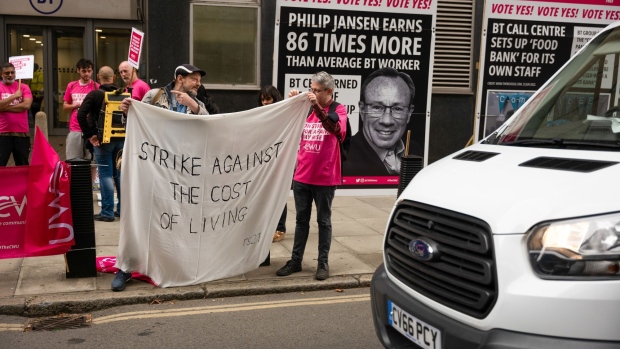Aug 15, 2022
Protests Against Soaring Energy Bills Spread Through UK, and CEOs Are Taking Notice
, Bloomberg News

(Bloomberg) -- In cities across Britain, people are stepping up protests against the rising cost-of-living and surging household energy bills forecast to hit £5,000 next year. And some big corporations are taking notice.“These numbers are off the charts and out of reach for most people across the country. So when protestors call for a freeze in the price cap, I can see completely where they’re coming from,” Scottish Power CEO Keith Anderson said in a statement published to company’s website on Sunday.He urged the government to offer support “on the size and scale” of the coronavirus pandemic.
A campaign called “Power To The People Glasgow” staged a protest on Friday at the headquarters of Scottish Power, which is owned by Spanish energy giant Iberdrola SA. The initiative, launched by local Labour Councillor Matt Kerr and trade unionist Frances Curran, is calling for a freeze in energy prices, the end of prepayment meters —a more expensive payment method that’s often used by poorer households— and an end to debt payment fees.
A separate organization, “Enough is Enough,” plans to kick off a series of 50 rallies across the UK on Wednesday. The left-wing group, backed by Labour MP Zarah Sultana and union bosses such as Mick Lynch, aims to take the financial burden off consumers. Its goals include a real-terms pay rise, reduced energy bills, an end to food poverty, the construction of affordable housing and higher taxes for big earners and corporations.A grassroots initiative, “Don’t Pay,” urges consumers to just stop paying energy bills. “As people talk to each other and spread the word, non-payment will become a socially acceptable stand against the unjust and unfair price gouging by the energy companies,” Don’t Pay organizer Jeffrey James told Bloomberg in an emailed statement. Nearly 170,000 people have so far pledged to stop paying their energy bills in October and over 30,000 people have signed up to organize meetings so far.
The “Don’t Pay” initiative was launched during a trades union demonstration in June and took off after power companies like Shell Plc and Centrica Plc, which supply gas and power to almost a third of UK households, reported record earnings. Shell has handed out an 8% bonus salary to most staff and plans to give $6 billion of cash back to shareholders in the form of a buyback while Centrica, the owner of British Gas, resumed dividends for the first time since the start of the pandemic.
“Mass non-payment is not a new idea,” said James, referring to the “Poll Tax Riots” which saw widespread opposition to a levy introduced by Prime Minister Margaret Thatcher and ultimately contributed to her downfall. “The rate at which momentum is already building in villages, towns and cities across the country shows we may be heading toward a similar moment.”In October, all UK households are set to receive £400 from the government to help pay energy bills, but soaring wholesale prices mean the support is unlikely to match the scale of the problem. Energy debt in July was already more than double last September’s level, reaching £1.3 billion in total, according to price-comparison service Unswitch.com — and that’s before an expected rise in the energy price cap comes into effect in October. These protests come as a wave of strikes is sweeping the country in response to rising prices and falling real wages. Thousands of workers, from barristers to train drivers, have staged walkouts while Royal Mail and Post Office workers are set to do the same in a few weeks. National Health Service nurses across England and Wales will vote on whether to strike next month, in what could be the first walkout in the history of the Royal College of Nursing.
Coll McCail, an organizer from “Power To The People Glasgow,” said he’s inspired by the industrial action seen across the UK. “It’s generating a climate in which people feel prepared to fight not just their employer, but their energy company, their landlord,” he said. “It shows just quite how fed up people are.”
©2022 Bloomberg L.P.


